Through original music and song compositions, this specially commissioned piece contrasts the poverty of Afghani farmers with the greed of multinational drug companies. The choral of lyrical songs question the profit drive powers that can threaten democracy through their overwhelming wealth and manipulation of advertising and the media.
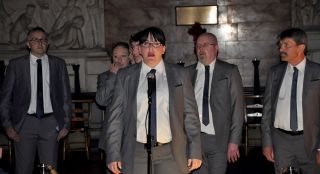
Background
In 2012, I was commissioned by RADE to make my second ‘song-cycle for theatre’ piece with participants of RADE Dublin.
RADE support people struggling with their substance dependency and help them to improve their quality of life and address their sense of isolation and boredom through the use of cultural activities that are plausible and attainable. We believe that what is missing in the lives of many users is the belief that they have a capacity to contribute to society.
As several of the participants were recovering addicts themselves, they had a particular insight into this as former buyers and sellers of prescription opiates on the black market.
I was tired of seeing community-based performances where essentially, the participants ‘failed’ on some level. Didn’t sing ‘properly’ some famous song.
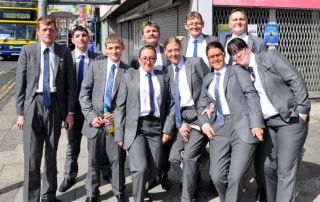
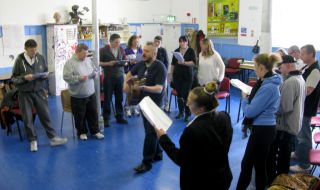
By making the subject matter one they were experts in – opiates and survival – it put them outside of a critical zone. No one was better qualified to do this piece of music than them. Some performances were shaky, some nights some of the performers were very vulnerable, some nights peoples families came. For me their vulnerability is a truth. For me this framing of the topic took the subject out of a ‘news cycle’ debate and made it reality.
I wanted a ritual, that honoured their experiences, that responded to them with dignity. A ritual around this subject matter, that has been central to the triumphs and tragedies of their lives, and, together, we made one.
We ended up putting it on in St Patrick’s Cathedral during Dublin Fringe. We got rave reviews and were nominated for a number of awards.
THE ROAD TO “THE LAST TEN YEARS”
A documentary on the lead-up to RADE’s Absolut Fringe debut with a production of ‘The Last Ten Years’.
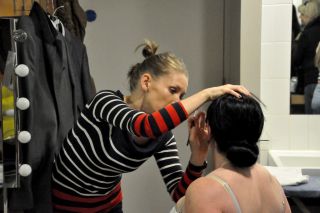
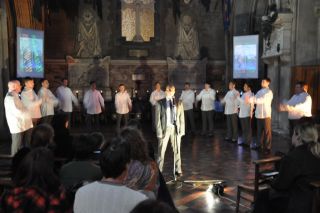
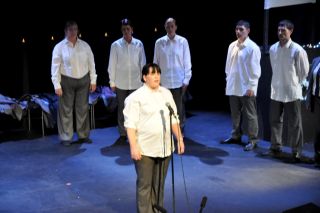
The piece was divided into two sections.
In the first piece “industry” we discussed the rise and rise of the pharmaceutical industry to being a hugely powerful player on money markets internationally, only behind Oil and Tech. And it’s main players global ambitions. We questioned the morality of wellness and healthcare becoming such massively traded stocks. It speculated too about the accompanying rise in prescription opioid addiction.
In the second piece “agriculture”, we discussed how the various Afghan wars had turned farming families into opium growers and participants in the world's illegal drug trade.
Again the participants, some of whom were end-users of the illegal opium, brought a truth to the performances. There was an understanding that, like the farmers, they were collateral damage of the global wars, that criminalised the poor and marginalised everywhere. We didn’t really really come to conclusions. The last songs refrain repeated again and again (a fantastic performance by Mary) was “its just business”. I suppose what we were saying was – is that ok? That it’s just business?
“The atmospheric St. Patrick’s Cathedral was the setting for the performance which sonically creates something magical crossing the line between theatre and actual living experience.”
Rade
“No less impressive, however, was The Last Ten Years, by Seán Millar and members of Dublin’s RADE programme (Recovery through Art, Drama & Education). This was a startling work, staged in the evocative surroundings of St Patrick’s Cathedral.
Woven around Millar’s excellent guitar accompaniment, the piece featured 11 performers, each of them recovering from addiction or mental-health issues.
Decked out in business suits and stylish designer specs, the 11 took turns to deliver a sharp invective against the monstrous rise of the prescription drug culture, indicting the pharmaceutical companies who have driven it.
Everything about the piece was affecting. Its iconography was suggestive. Millar’s songs rose and fell on seductive chord changes and the lyrics were full of sinister refrains. The vulnerability of the performers, too, was very moving. Not that there was anything remotely ‘worthy’ about the production. This was theatre with teeth.
Ultimately, the real strength of The Last Ten Years resided in its political engagement, and in the way it succinctly exposed the checkered past of pharmaceutical products (as heroin originally was) and the hypocrisies surrounding the illegal drug trade.
The piece was nominated for the Spirit of the Fringe prize. (The prize went to Paperdolls for their blend of acrobatics and dance, in Constellations).”
Irish Examiner
“‘We create the problems so we can sell you the solutions. It’s our job.’
In the intimate setting of a side chapel, within the majestic and glorious St Patrick’s, some gutsy theatre is created. The raw materials: 11 real people, who have each clearly lived a life, and the alchemy of singer-songwriter Sean Millar. The result is some strong truths, and a compelling piece of politically-engaged art. The RADE (Recovery through Art, Drama & Education) performers are disciplined, dignified, with strong stage presence. Initially besuited, bespectacled, they address the audience directly, and sing a series of sometimes affecting, sometimes powerful songs, accompanied by Millar, and occasional, apposite slide projections. The message draws connections; this is a whole world view rather than individuals’ personal stories. The billion-dollar international pharmaceutical drug business and the impoverished Afghani poppy farmers. The legal drugs business that has become more powerful than states. A “war on [illegal] drugs” that makes money for elites who have a vested interest in it never ending. The Mexican drug cartel billionaire’s “gracias amigos” to the US because its criminalisation policies have made him rich. If demand dried up, the Afghani economic disaster would have Irish famine proportions.
This is very impressive musical theatre, created by people directly affected by the issues it addresses so forcefully. So while the vision is bleak, its expression is uplifting. What’s inexplicable is that RADE’s challenging programme is threatened by cuts.”
★★★★
Deirdre Falvey
The Irish Times
September 20th, 2012